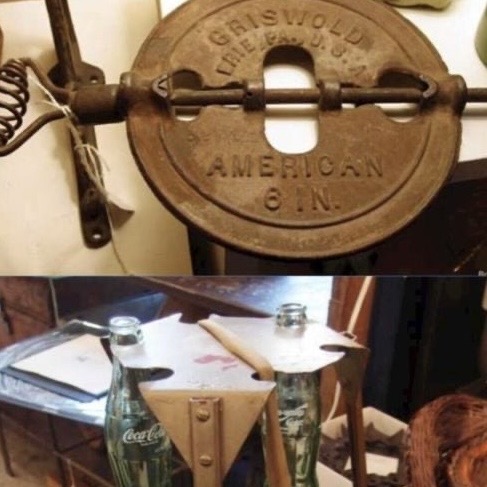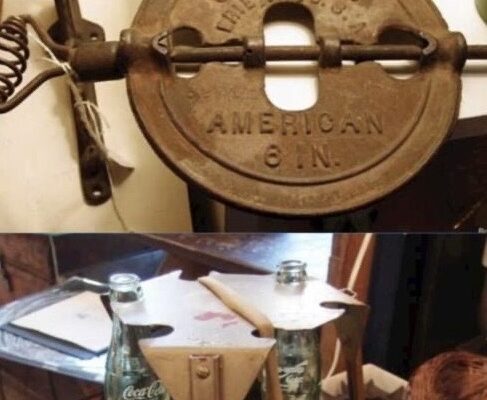Can You Guess What They Were Used For?

Today, let’s have a little game! What purpose did these vintage items serve, do you know? These enigmatic things, which range from strange equipment to unusual decorative pieces, may leave you perplexed. Don’t worry, though; try it and see if you can envision what people in earlier eras did with these fascinating objects.
First Item: The Coin Gatherer

First up, we have a mixed-metal object with connectors on the sides and slots on top. Do you know what it was used for in the past?
You’re 100% correct if you assumed it was a coin collector! Conductors of trains and buses would deposit the fares into slots and then pick up the neatly piled coins from the bottom. They could fasten it to their belts using the hooks on the sides. Remarkably, a contemporary rendition of this is still in use at a few locations where admission is free of charge. Pretty smart, huh?
The Sand-Filled Swim Cap is item #2.

This is an intriguing cap with chin straps, a blue interior, and a feminine printed pattern. Would you want to guess? Here’s a hint: it has sand inside of it!
Actually, this peculiar headgear is an antique handmade swim cap. People used to love modeling swim caps after the aviatrix fashion trend back in the 1920s. However, home sewers had trouble finding rubber ingredients. They then devised a clever fix: the cap was filled with sand, and the channels and stitches were machine-sewn.
Why the sand? As a water blocker, it lets swimmers select their own fabric pattern rather than being restricted to yellow or black rubber. Undoubtedly a novel strategy!
The Iron Flue Damper is item #3.

Now look at this iron object that has two stamps on it. Along an iron post with a spiraling end, the iron plate swivels. Any suggestions?
You’re exactly right if you assumed it to be an iron flue damper! Even though they are rarely seen, these iron flue dampers are still in use today. We enjoy finding unique artifacts that are a part of our past when we go antique shopping. It resembles going back in time!
The Victorian Shop Dispenser (Item #4)

Admire this metal box with a beveled glass front and elaborate gold stenciling. It even features a tiny sliding door with a dog picture on it. How do you suppose it was put to use?
Actually, this graceful box is a Victorian-style shop dispenser. It came in several sizes and was intended for bulk sales. This one had a label insert for gunpowder, but it may have also been used for bulk commodities like sugar or confectionery. Customers could see the quality of the products they were buying because to the glass front. Why was there a picture of dogs hunting? Well, since the purpose was to hold gunpowder exclusively, it’s merely an ornamental touch. This is a very fascinating essay, isn’t it?
The Cedar Butter Churn is item #5.

Take a look at this big wooden drum with a handle, a footed base, and a lid. There’s a crank on the side of it also. Any ideas about what it’s meant to accomplish?
This wooden drum is a butter churn made of cedar. To produce more butter, it was utilized. It says “Farm Master Dairy Supplies” on the other side. However, we didn’t want to reveal anything too quickly! Knowing about these antiquated gadgets truly transports us to a bygone era of ease.
The Soda Bottle Stand is item #6.

Look at this three-tiered metal stand for a moment. Each tier has a notch carved out of it. It is nearly four feet tall and supports itself on three legs. What was the purpose of it, do you suppose?
The purpose of this booth was to showcase Coke bottles—but not just any soda. Nehi purposely made it as part of their marketing strategy for their soda bottles. With their handy necks, the bottles fit well in the triangle shape with the notches. These stands used to be found in grocery stores and local stores during the Great Depression. They were really impressive!
There you have it, then! These enigmatic objects transport us through time and serve as a reminder of the inventiveness and resourcefulness of earlier generations. How many of those were accurate guesses, then?



